|
|
|
Sort Order |
|
|
|
Items / Page
|
|
|
|
|
|
|
| Srl | Item |
| 1 |
ID:
142038
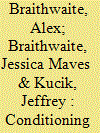

|
|
|
|
|
| Summary/Abstract |
Violent domestic conflicts spread between countries via spillover effects and the desire to emulate events abroad. Herein, we extend this emulation logic to the potential for the contagion of nonviolent conflicts. The spread of predominantly nonviolent pro-democracy mobilizations across the globe in the mid-to-late 1980s, the wave of protests in former Soviet states during the Color revolutions in the 2000s, and the eruption of nonviolent movements across the Middle East and North Africa during the Arab Spring in the early 2010s each suggest that the observation of collective action abroad encourages a desire to emulate among potential challengers to domestic autocrats. However, the need to emulate varies. Potential challengers with a recent history of protest at home are less dependent (than are those without similar experience) upon foreign exemplars to mobilize the participants and generate the resources required to make emulation practicable. By contrast, where the domestic experience of protest is absent, opposition movements are more reliant upon emulation of foreign exemplars. We test the implications of this logic using a series of multivariate logistic regression analyses. Our tests employ data on nonviolent civil resistance mobilizations that occurred across the global population of autocratic states between 1946 and 2006. These tests, along with post-estimation analysis, provide evidence consistent with our conditional logic of emulation.
|
|
|
|
|
|
|
|
|
|
|
|
|
|
|
|
| 2 |
ID:
088450
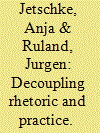

|
|
|
|
|
| Publication |
2009.
|
| Summary/Abstract |
Why have ASEAN member states declared and why do they continue to declare their intention to enhance cooperation and devise projects when implementation lags behind their rhetoric? Why do they rhetorically commit themselves to cooperation, when they continue to stick to self-interested policies to the detriment of ASEAN's collective interest? And given these diverging practices, how likely is it that the objective of a more legalized and binding cooperation associated with the recently ratified ASEAN Charter is being implemented? This article draws attention to ASEAN's hybrid or dual character of international cooperation, consisting of the emulation of the European integration project and the persistence of deeper cultural strata of Southeast Asia's cooperation project that determine the limits of cooperation: Southeast Asia's social structure and political culture that have not produced those mechanisms that might facilitate international cooperation. If our explanation is correct that cooperation within ASEAN comes about as a simultaneous process of emulation and established cultural practices, we expect change only under specified conditions. Based on our argument and the theoretical literature on normative change, we identify and discuss in greater detail three potential outcomes of change: inertia, localization and transformation. The three modes make different predictions concerning change within ASEAN. Based on an analysis of the two major shocks with which ASEAN has had to contend in the last two decades, namely the Cold War in Asia and the Asian financial crisis, we argue that ASEAN's dominant response to major ideational challenges has been combinations of localization and inertia and has not been followed by a fundamental change of practice
|
|
|
|
|
|
|
|
|
|
|
|
|
|
|
|
| 3 |
ID:
115729
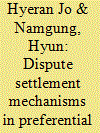

|
|
|
|
|
| Publication |
2012.
|
| Summary/Abstract |
Preferential trade agreements (PTAs) have increased dramatically in the past several decades and play an important role in the global economy. Dispute settlement mechanisms (DSMs) in these international agreements significantly influence their functioning. In this article, the authors seek to understand what factors determine the legal arrangements of these mechanisms. The authors argue that the confluence of domestic political regime type, emulation incentives, and the development of the multilateral trade regime determines their legal dimension. Using a data set of PTAs between 1957 and 2008, the authors show that (1) democracies are more likely than autocracies to prefer moderately strict DSMs, (2) trading partners increasingly emulate each other by adopting similar legal templates, and (3) the recent trend against legalistic mechanisms is largely driven by the development of the multilateral trade regime. Their findings have important implications for the design of international institutions by highlighting the importance of member-specific as well as macro-level factors.
|
|
|
|
|
|
|
|
|
|
|
|
|
|
|
|
| 4 |
ID:
156613
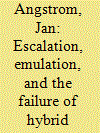

|
|
|
|
|
| Summary/Abstract |
In this article, I argue that hybridization is a contingent result of the dynamics of some conflicts but not others. In particular, faced with opponents with great power, weaker powers seek a situation of asymmetry to gain victory. Drawing on within-case analysis of the conduct of war during the past thirty years in Afghanistan, I demonstrate that what we now consider to be “hybrid” represents an important continuity and strategic option in Afghan warfare. Still, the analysis also demonstrates that choosing “hybrid” has not been a strategy that has worked. Hezb-i-Islami's rather limited attempt for conventionalization of the war against the forces of Dostum and Massoud in 1992 failed and the Taliban's more far-reaching attempt for conventionalization has so far also failed to reap strategic success. This suggests that the threat of hybrid war is inflated.
|
|
|
|
|
|
|
|
|
|
|
|
|
|
|
|
| 5 |
ID:
175343
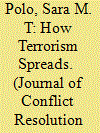

|
|
|
|
|
| Summary/Abstract |
Previous research on the causes of domestic terrorism has tended to focus on domestic determinants. Although this approach can be helpful to understand many causes of terrorism, it implicitly disregards how the tactical choices made by similar nonstate actors elsewhere influence a group’s decision to resort to terrorist tactics. This study argues that the adoption of terrorism among ethnic and ethnoreligious groups results from a process of conditional emulation. Groups are more likely to emulate the terrorist choice of others with whom they are connected by shared political grievances and spatial networks. The theory is tested on a new and original group-level data set of ethnic and ethnoreligious terrorism (1970 to 2009) using geospatial analysis and spatial econometric models. The results provide strong support for the hypothesized mechanism leading to the diffusion of terrorism and suggest that emulation—more than domestic and contextual factors—substantially influences dissidents’ tactic choice.
|
|
|
|
|
|
|
|
|
|
|
|
|
|
|
|
| 6 |
ID:
075220
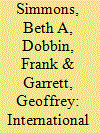

|
|
|
|
|
| Publication |
2006.
|
| Summary/Abstract |
Political scientists, sociologists, and economists have all sought to analyze the spread of economic and political liberalism across countries in recent decades. This article documents this diffusion of liberal policies and politics and proposes four distinct theories to explain how the prior choices of some countries and international actors affect the subsequent behavior of others: coercion, competition, learning, and emulation. These theories are explored empirically in the symposium articles that follow. The goal of the symposium is to bring quite different and often isolated schools of thought into contact and communication with one another, and to define common metrics by which we can judge the utility of the contending approaches to diffusion across different policy domains.
|
|
|
|
|
|
|
|
|
|
|
|
|
|
|
|
| 7 |
ID:
160945
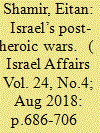

|
|
|
|
|
| Summary/Abstract |
This article examines the role of American military influence on Israel’s transition to post-heroic warfare. The main factors identified in the existing literature that have been identified to explain Israel’s transition to post-heroic warfare had to do with the changes in Israel’s strategic environment, changes in society and development of new military technology. This article sheds light on an intervening factor that further enables and shapes the transition to post-heroic war; the American military influence over the Israel Defence Forces. The strategic uncertainty and lack of professional direction encouraged Israel’s military establishment to turn to American military ideas. The US military is perceived by the IDF as a leading professional institution that is dealing with similar challenges and operating under similar constraints.
|
|
|
|
|
|
|
|
|
|
|
|
|
|
|
|
| 8 |
ID:
148252
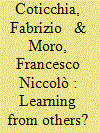

|
|
|
|
|
| Summary/Abstract |
How does military change take place in states that are not able to develop autonomous solutions? How does transformation occur when limited resources are available? What are the “sources of military change” for armed forces that do not possess the (cognitive and material) resources that are essential for autonomous development? In articulating an answer to these questions, this article draws from the theoretical debate on interorganizational learning and looks at the mechanisms that drive “learning from others.” We argue that adaptation and organizational learning often had to look for, and then try and adapt, off-the-shelf solutions that required relatively more limited resources. Empirically, the article focuses on the Italian Armed Forces, which have rarely attracted scholarly attention, although it emerged from almost total lack of activity in the Cold War to extended deployments in the 2000s.
|
|
|
|
|
|
|
|
|
|
|
|
|
|
|
|
| 9 |
ID:
183773
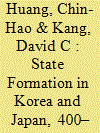

|
|
|
|
|
| Summary/Abstract |
State formation occurred in Korea and Japan 1,000 years before it did in Europe, and it occurred for reasons of emulation and learning, not bellicist competition. State formation in historical East Asia occurred under a hegemonic system in which war was relatively rare, not under a balance-of-power system with regular existential threats. Korea and Japan emerged as states between the fifth and ninth centuries CE and existed for centuries thereafter with centralized bureaucratic control defined over territory and administrative capacity to tax their populations, field large militaries, and provide extensive public goods. They created these institutions not to wage war or suppress revolt: the longevity of dynasties in these countries is evidence of both the peacefulness of their region and their internal stability. Rather, Korea and Japan developed state institutions through emulation and learning from China. The elites of both copied Chinese civilization for reasons of prestige and domestic legitimacy in the competition between the court and the nobility.
|
|
|
|
|
|
|
|
|
|
|
|
|
|
|
|
| 10 |
ID:
176682
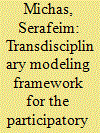

|
|
|
|
|
| Summary/Abstract |
Efficient policymaking is crucial towards climate change mitigation. However, policies’ successful implementation depends largely on the context where they are applied. Classic decision-making used to be based on a static plan that was considered optimal for the “most likely” future contextual outcome. However, predicting the most probable evolution of this context has been proved unsuccessful, since it is vulnerable to unanticipated parameter change. Dynamic Adaptive Policy Pathways can address this problem focusing on the design of short-term policies, with simultaneous definition of adaptive interventions to be chosen on the long-term. This article presents a transdisciplinary modeling framework, which builds on the original Dynamic Adaptive Policy Pathways methodology. To demonstrate the applicability of this framework the authors used it to explore the evolution of the small-scale solar photovoltaics share in Greece, towards the achievement of the national capacity targets of 2025 and 2030. Model outcomes facilitated the identification of several pathways achieving the capacity targets, while reducing the risk for retroactive policy changes. Overall, the presented study demonstrates potential to support the design of adaptive policies over contextual evolutions so that social, economic and technological aspects of integrative planning are balanced towards the achievement of climate targets.
|
|
|
|
|
|
|
|
|
|
|
|
|
|
|
|
|
|
|
|
|